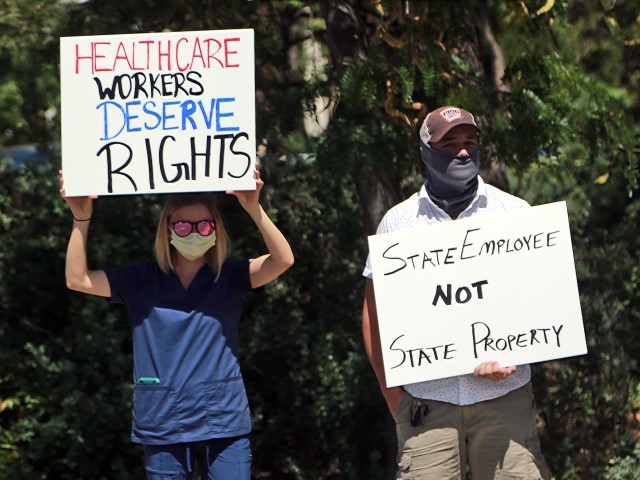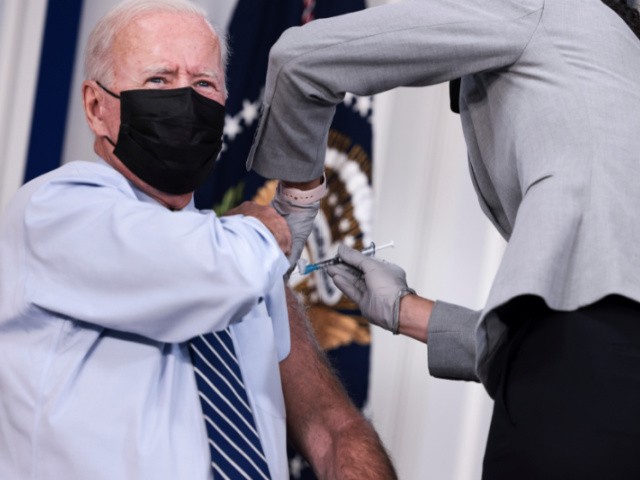Judge Strikes Down Joe Biden’s Vaccine Mandate for Healthcare Workers
A judge halted President Joe Biden’s federal vaccine mandate for healthcare workers in ten states on Monday, court documents show.
Missouri-based U.S. District Judge Matthew Schelp, who was appointed by former President Donald Trump, issued the preliminary injunction for employees at Medicare and Medicare-certified medical facilities in North and South Dakota, Nebraska, Wyoming, New Hampshire, Missouri, Kansas, Iowa, Alaska, and Arkansas. Under the Biden administration’s mandate, healthcare workers who work at hospitals, nursing homes, and other healthcare facilities that receive federal funding have been ordered to get vaccinated against COVID-19 by January 4, receive a medical or religious exemption, or face firing.
Schelp in his 32-page opinion decided that the detrimental impact of losing qualified healthcare workers outweighs the need for employees to be vaccinated and said the mandate imposes a burden “on the ability of healthcare facilities to provide proper care, and thus, save lives.”
“The scale falls clearly in favor of healthcare facilities operating with some unvaccinated employees, staff, trainees, students, volunteers, and contractors, rather than the swift, irremediable impact of requiring healthcare facilities to choose between two undesirable choices — providing substandard care or providing no healthcare at all,” he wrote.
In his opinion, Schelp clearly laid out three ways in which Biden’s vaccine mandate is unlawful, leaving little doubt as to what his final ruling would be. Firstly, he argued that the Biden administration did not follow Supreme Court precedent in issuing the mandate because it did not first seek the approval of Congress to enact such a wide-reaching rule.
“But even if Congress’s statutory language was susceptible to CMS’s [Centers for Medicare & Medicaid Services] exceedingly broad reading—which it is most likely not—Congress did not clearly authorize CMS to enact the this politically and economically vast, federalism-altering, and boundary-pushing mandate, which Supreme Court precedent requires,” he wrote.
Secondly, he noted that even if Congress had approved the rule, failure to allow notice and comment before enacting the mandate is “grounds for invalidating the rule.”
“Here, Plaintiffs are likely to succeed in their argument that CMS unlawfully bypassed the APA’s notice and comment requirements,” he wrote. “…And good cause is not automatically created based on an agency’s conclusion that bypassing the notice and comment requirements is necessary to protect public safety.”
Lastly, Schelp said the plaintiffs are “likely to succeed” in establishing that the vaccine mandate for healthcare workers is “arbitrary or capricious.” More specifically, he challenged the Biden administration’s reasoning for the mandate on several fronts, including that the CMS “lacks evidence” showing that “vaccination status has a direct impact on spreading COVID in the mandate’s covered healthcare facilities.”

Nurse Katrina Philpot protests against COVID-19 vaccine and mask mandates demonstrate near the state Capitol on Friday, Aug. 20, 2021, in Santa Fe, N.M. Gov. Michelle Lujan Grisham issued a health order this week obligating hospital workers to get COVID-19 vaccines. State workers are also ordered to get vaccinated. Philpot says her Rio Rancho hospital will fire her if she doesn’t get her shots. (AP Photo/Cedar Attanasio)
“In general, the overwhelming lack of evidence likely shows CMS had insufficient evidence to mandate vaccination on the wide range of facilities that it did. Looking even beyond the evidence deficiencies relating to the specific facilities covered, the lack of data regarding vaccination status and transmissibility—in general—is concerning,” he wrote.
He also contended that the Biden administration “failed to consider or rejected obvious alternatives to a vaccine mandate without evidence.”
“For example, CMS rejected daily or weekly testing—an option that even OSHA approved in its ETS—without citing any evidence for such a conclusion,” he continued.
The judge further pointed to how the Biden administration has ignored science by excluding any exceptions for natural immunity.
“…As another example, CMS rejected mandate alternatives in those with natural immunity by a previous coronavirus infection,” he said.
He added that CMS failed to adequately explain its contradiction to its “long-standing practice of encouraging rather than forcing—by governmental mandate—vaccination.”
The judge also cited several instances in which healthcare facilities will suffer or even “be forced to close altogether” if those facilities lose employees due to Biden’s vaccine mandate.
“Thus, if the mandate goes into effect, it will irreparably harm patients by impeding access to care for the elderly and for persons who cannot afford it—directly contrary to Medicare and Medicaid’s core objective of providing proper care,” he continued. “In sum, Plaintiffs’ evidence shows that facilities—rural facilities in particular—likely would face crisis standards of care or will have no choice but to close to new patients or close altogether, both of which would cause significant, and irreparable, harm to Plaintiffs’ citizens.”

U.S. President Joe Biden receives a third dose of the Pfizer/BioNTech Covid-19 vaccine in the South Court Auditorium in the White House September 27, 2021 in Washington, DC. Last week President Biden announced that Americans 65 and older and frontline workers who received the Pfizer-BioNTech COVID-19 vaccine over six months ago would be eligible for booster shots. (Photo by Anna Moneymaker/Getty Images)
In September, the Centers for Disease Control and Prevention confirmed this concern after surveying workers at more than 2,000 hospitals across the country. At the time, at least 30 percent of those workers were unvaccinated.
“Applied to a nationwide healthcare workforce of some 22 million according to the Census Bureau, that would equal nearly seven million who have yet to get inoculated,” the Wall Street Journal reported.
The 10 states ultimately sued the Biden administration over claims the vaccine mandate is unconstitutional. Schelp said halting the mandate will allow time to “ensure that federal agencies do not extend their power beyond the express delegation from Congress.”
The Biden administration is forbidden from enforcing its vaccine mandate “pending a trial on the merits” of the mandate or “until further order of this Court.”
The Biden administration will most likely appeal Schelp’s decision and could do so before the final judgment is even reached. If Biden does appeal, the case would go to the conservative-leaning U.S. Court of Appeals for the Eighth Circuit before possibly reaching the U.S. Supreme Court.
The case is Missouri v. Biden, No. 4:21-cv-1329 in the U.S. District Court for the Eastern District of Missouri.





Comments are closed.